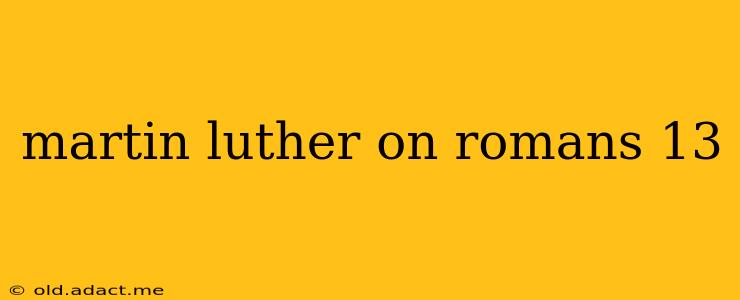Martin Luther's interpretation of Romans 13 is complex and, at times, contradictory, reflecting the evolving nature of his theological understanding and the turbulent socio-political context of his time. While he initially championed a relatively straightforward reading emphasizing obedience to authority, his later writings reveal a more nuanced and, in some ways, revolutionary perspective. Understanding Luther's views requires careful examination of his different works and the historical circumstances surrounding them.
What does Romans 13 actually say?
Before delving into Luther's interpretation, it's crucial to understand the text itself. Romans 13:1-7 urges submission to governing authorities: "Let every person be subject to the governing authorities. For there is no authority except from God, and those that exist have been instituted by God. Therefore whoever resists the authorities resists what God has appointed, and those who resist will incur judgment." The passage continues to emphasize paying taxes, showing respect, and owing nothing but love.
Did Luther always interpret Romans 13 the same way?
No, Luther's interpretation of Romans 13 evolved significantly throughout his life. In his earlier writings, particularly during his more conciliatory period before the full break with the Catholic Church, he emphasized the importance of obedience to secular rulers. This was partly a strategic move to avoid immediate conflict, and partly a reflection of his understanding of the divinely ordained order.
What changed Luther's view on Romans 13?
Several factors contributed to the shift in Luther's interpretation. The escalating conflict with the Catholic Church and the Holy Roman Empire forced him to confront the limitations and potential abuses of political authority. He witnessed firsthand the cruelty and injustice inflicted by those in power, leading him to question the absolute nature of obedience prescribed in Romans 13. His increasing emphasis on individual conscience and the authority of Scripture also played a crucial role.
Did Luther advocate for rebellion against all authority?
No, Luther did not advocate for outright rebellion against all authority. However, his later writings demonstrate a more critical and qualified approach to Romans 13. He argued that obedience to the state was conditional upon its adherence to God's law. If the state acted unjustly or violated God's commands, then Christian conscience would dictate a different course of action, potentially including civil disobedience or even resistance. This is a crucial distinction: Luther didn't promote anarchy, but rather emphasized the limits of earthly power in relation to divine law.
What did Luther mean by "temporal" and "spiritual" authority?
Luther differentiated between "temporal" (secular) and "spiritual" authority. He believed that temporal authority had jurisdiction over earthly matters, while spiritual authority, residing in the church, had jurisdiction over matters of faith and salvation. His conflict with the Catholic Church stemmed from the perceived encroachment of temporal authority (the Emperor and the Pope) upon spiritual authority, an encroachment he saw as a violation of God's order. This distinction helped him to articulate the boundaries of obedience to secular rulers.
How did Luther reconcile his view of Romans 13 with his actions against the Church?
Luther's actions, such as the burning of papal bulls and his defiance of the Emperor, can be interpreted as a form of civil disobedience justified by his belief that the actions of the Catholic Church violated God's law and threatened the salvation of souls. In his view, obedience to God superseded obedience to unjust human authority. This position, while controversial, reflects the complexities of his theological and political thought.
What is the lasting impact of Luther's interpretation of Romans 13?
Luther's nuanced interpretation of Romans 13 had a profound and lasting impact on the development of Western political thought. His emphasis on individual conscience, the limits of secular authority, and the potential for civil disobedience profoundly influenced subsequent movements for religious freedom, political reform, and human rights. His complex engagement with this passage continues to stimulate theological and political debate. It showcases the tension between obedience to authority and the demands of conscience – a tension that remains relevant in contemporary discussions of ethics, law, and the role of religion in the public sphere.
